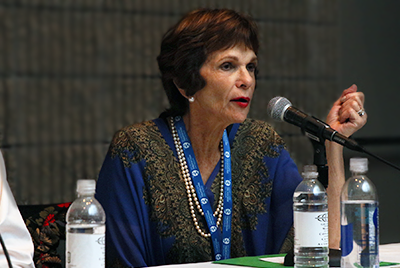Kitty Dukakis, Veterans Share Personal Stories of the Effectiveness of ECT

Patients and clinician scientists came together on Monday to discuss the effectiveness of electroconvulsive therapy (ECT) and the need for greater access to ECT in Veterans Health Administration (VHA) facilities.
“ECT became an option for me 21 years ago,” said the session’s special guest, Kitty Dukakis (pictured above), former first lady of Massachusetts and wife of former Democratic presidential nominee Michael Dukakis. Years before treatment, Dukakis suffered from severe symptoms of depression and alcohol use. “After ECT therapy, I felt better. I was able to live life.”
Dukakis was joined on the panel by veterans who also spoke about their experiences with ECT.
“I had been on medication after medication, pill after pill,” said Diana Weathers, a former member of the U.S. Navy who spoke about living with bipolar disorder. Weathers said that she was advised to undergo ECT after she told her physician that she was contemplating suicide. “After receiving ECT once every two to three days for eight weeks, I felt lighter,... started reading again, ... and started to enjoy life again,” she said.
Weathers told the audience that her husband was a supportive advocate of ECT. However, this type of support is not given to all ECT recipients because of the stigma commonly associated with it.
“My wife was not an advocate; she still is not,” said Jim Bush, a Marine veteran who had served in Vietnam. “She dislikes the short-term and long-term memory loss,” he told the audience. “However, I don’t know whether my memory loss was due to my mental health condition or ECT.”
According to Richard Weiner, M.D., interim chair of psychiatry and behavioral sciences at Duke University, anterograde and retrograde memory loss are common side effects of ECT. “The severity and persistence vary,” he said. Other side effects include confusion, delirium, and pain at the site of electrode stimulation.
“Of course, I had headaches after ECT and pain in my mouth,” said Weathers, “but that all subsided relatively quickly. The progress that I made with ECT was worth the side effects, at least for me.”
Peter Hauser, M.D., a clinical professor of psychiatry at the University of California, Irvine, and chair of the session, said that 140 of the VHA’s facilities—approximately 49 percent—offer ECT to patients, on both an inpatient and outpatient basis. But that is not enough, he added.
“Because ECT has such a rapid onset of effectiveness for major depressive disorder and comorbid posttraumatic stress disorder, we really need to consider and offer ECT earlier after onset of these conditions, and not just as a last line of treatment,” Hauser concluded.
(Image: David Hathcox)
|
|
|
|
|


